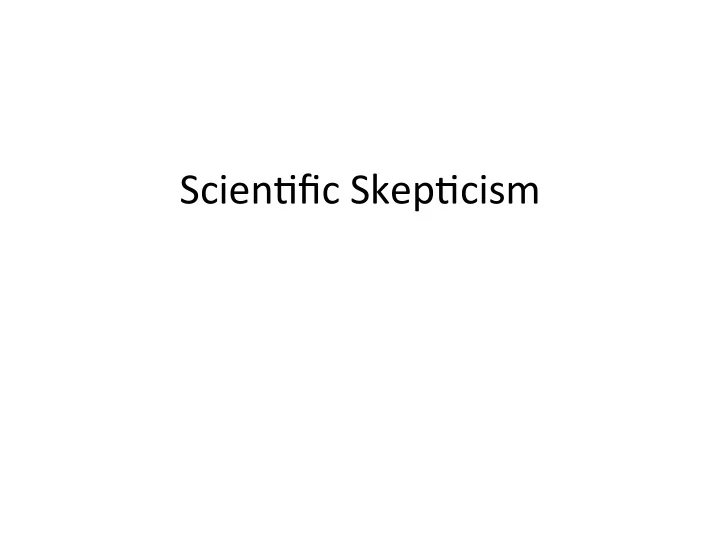

Scien&fic Skep&cism
What is Skep&cism • What does it mean to be skep&cal? – Small group discussion • There is an important dis&nc&on between skep&cism in a general sense and scien&fic skep&cism. – Climate deniers are some&mes called climate skep&cs – This is very different from someone looking cri&cally at claims, inferences, sta&s&cs , funding, etc for poten&al bias. This is scien&fic skep&cism
More on Skep&cism • Why is scien&fic skep&cism an important skill for people to have? – Small group discussion • Early human history – Informa&on rare and hard to find, and it had to be high quality, oGen life or death. (sources of food, water, etc) • Informa&on is so prevalent in our lives today, that it is known as the “Informa&on Age” • Today, you can find informa&on everywhere, and a lot of it is of very poor quality or even completely misleading • Being literate today means not just being able to read, but being able to understand the massive amount of informa&on thrown at us every day. Understanding and determining the quality of informa&on is cri&cal today • Manipula&on by informa&on – Google knows more about you then your parents or spouse.
Two Focal Areas for Scien&fic Skep&cism 1. Genera(on of Science Knowledge – How does science work? Consider the reliability of each step of the process – Observa&onal, Conceptual, Sociocultural. How might bias enter or be expressed at each step? 2. Communica(on of Science Knowledge – How is science informa&on shared with the public. Consider authors & audiences, meanings & messages, representa&ons & reality. How might bias enter or be expressed at each step?
Skepticism and GMO Studies • https://geneticliteracyproject.org/mission-financials-governorship/
Skepticism and GMO Studies
Skepticism and GMO Studies
Sta&s&cs can be manipulated
How Sta&s&cs can be manipulated • Sample bias • Analysis bias • Repor(ng sta(s(cal func(ons without context • Graphic Representa(ons
Sample Bias • It is impossible to count every single plant in a field, every bacteria in a culture • Scien&sts strive to take a representa&ve sample from the en&re popula&on • Small group discussion – What can help pick a representa&ve sample?
Eye Color example • Use handout to determine sta&s&cs on eye color • Compare your table, en&re class to following data:
How the analysis of data can be biased
Repor&ng Sta&s&cal Func&ons without Context • Repor&ng an average or percentage with a very small sample size • Using sta&s&cal terminology without the full context of the situa&on. Average, Median, Mode, etc • Example $1000 distributed within this class: – 40 students @ $25 each = $1000 = $25 avg – 39 students @ $0, 1student @ $1000 = $25avg
Graphics are commonly used to mislead
How to look at informa&on skep&cally • Know Your Sources Document! • Look at the sources – If none given, do NOT trust • Look for Bias with sample, analysis, lack of context, and graphics • Do NOT believe everything you are shown just because it has “science” or “data” in the name. Does the source have other mo&ves to manipulate your opinion.
References hips://cseweb.ucsd.edu/~ricko/CSE3/Lie_with_Sta&s&cs.pdf How to Lie with Sta&s&cs By Darrell Huff, Norton, New York, 1954 The Visual Display of Quan&ta&ve Informa&on By Edward TuGe, Graphics Press, 1997 hips://gene&cliteracyproject.org/mission-financials-governorship/ hip://advances.sciencemag.org/content/2/8/e1600850.full NAMLE. (2007). Core principles of media literacy educa&on in the United States: Na&onal Associa&on for Media Literacy Educa&on Associa&on. Allchin, D. (2011). Evalua&ng knowledge of the nature of (whole) science. Science Educa2on, 95 (3), 518-542. Allchin, D. (2013). Teaching the nature of science: perspec2ves & resources . Saint Paul: Ships Educa&on Press.
Recommend
More recommend